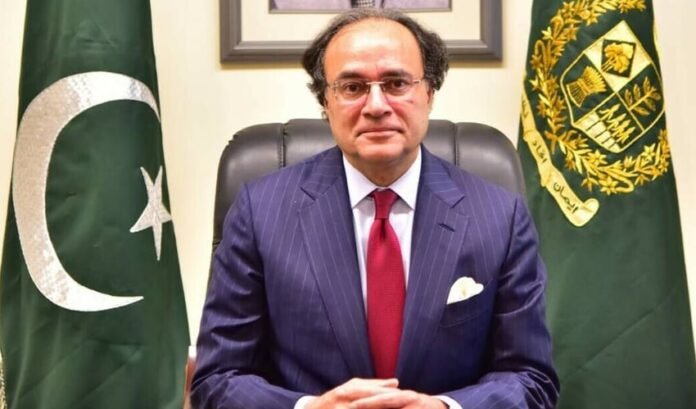Federal Finance Minister Muhammad Aurangzeb stated that digitizing the financial system is a priority and that there is no opportunity to bring everyone onto the tax internet.
Addressing a post-budget press conference with the economic team, Muhammad Aurangzeb said that the government plans to raise the tax-to-GDP ratio to thirteen percent and that digitizing the economy is the authorities’ top priority.
Journalists’ Protest
When Finance Minister Muhammad Aurangzeb arrived for the post-budget press conference, media representatives protested against salary taxes.
The media representatives stood up from their seats and protested, saying that the salaried class bears the heaviest tax burden and that the government should take measures to provide relief for the middle class.
Objection to Increased Taxes on Salaried Class Rejected
Muhammad Aurangzeb rejected objections to the increased taxes on the salaried class, stating that the government would tax higher incomes more heavily, and no one should have an issue with this.
He said the government would decide on imposing a petroleum levy tax by observing global oil companies, whose matters they are monitoring. He found the concept of non-filers incomprehensible, suggesting that it might not exist in any other country. The government is increasing the tax rate on the business and transactions of non-filers to bring them into the tax net.
Implementation of Higher Taxes on Higher Incomes
The Finance Minister emphasized the need to amplify the tax base, noting that a ten percent tax-to-GDP ratio is unsustainable, and the aim is to attain thirteen percent. The government will improve various institutions to achieve this. They will maintain the minimum exemption for the salaried class, with a maximum tax of 35 percent.
Muhammad Aurangzeb noted that 31,000 retailers have registered, and the tax will be implemented in July. This tax should have been imposed in 2022. Bringing retailers and wholesalers into the tax net aims to share the burden. Changes in tax slabs are possible, and there is no alternative to getting everyone into the tax net.
Facilities for Youth in the IT Sector
He mentioned that the FBR workforce has been mobilized, and Miftah Ismail has proposed a fixed tax in 2022. Facilities will be provided for young people in the IT sector to create job opportunities.
He added that this budget has facilitated individuals under the PISP. Previous finance ministers had assured traders of facilities.
Encouragement for Traders to Register
He noted that the government maintains the six lakh rupees income tax exemption on salaries and sets a 45 percent tax for the non-salaried professional community. Bringing retailers and wholesalers into the tax net is essential.
The Finance Minister said that he requested traders to register voluntarily in April, and 31,000 retailers have already done so.
90 Trillion Rupees in Cash Circulation
He stated there is no choice but to bring these sectors into the tax net. From July, retailers and wholesalers will be taxed. Currently, 90 trillion rupees are in cash circulation, and the aim is to eliminate cash transactions.
He pointed out that IT exports amount to 3.5 billion dollars. SMEs still need to receive the necessary financing, and the goal is to end cash transactions.
New Bank Schemes
He announced new schemes with the Governor of the State Bank aimed at increasing agricultural financing and providing financing for freelancers and SMEs. Exim Bank will take over the export refinance facility, and the government will complete ongoing projects in the PSDP.
Pakistan’s Third Largest Freelancer Population Globally
Finance Minister Muhammad Aurangzeb stated that Pakistan has the third-largest freelancer population globally. The government allocated a significant amount to the IT sector to improve infrastructure. They intended the track-and-trace system for tobacco, cement, fertilizer, and other sectors. Implementing the system might have been problematic.
He emphasized the need to plug substantial sales tax leakages and digitize end-to-end sales tax processes. The government has data on vehicle ownership and utility bills, and a team will review this data for compliance.
He mentioned that government withdrawal from certain sectors would be beneficial, creating an environment for the private sector to thrive. The track and trace system aims to prevent tax evasion in various sectors, including tobacco and cement.
Denial of Immediate Increase in Petroleum Levy
Finance Minister Muhammad Aurangzeb denied any immediate increase in the petroleum levy. He stated that the government would raise it gradually, considering global oil prices.
Shehbaz Sharif’s Path is Difficult but Possible: Minister of State
Minister of State for Finance Ali Pervaiz Malik remarked that Shehbaz Sharif’s chosen path is difficult but possible. He acknowledged the impact of inflation on ordinary people.
Ali Pervaiz Malik argued that if the government didn’t increase taxes for the salaried class, then whom would they impose them on? In the past, the government covered deficits by printing money or borrowing, which burdened future generations. The budget provides the most subsidies to the power sector.
He further noted that “sacred cows” generate income outside the system without paying taxes. In addition to Pakistan, Argentina also approaches the IMF for loans.
He mentioned that Shehbaz Sharif wanted to provide 100 times more relief. When deficits increase, it leads to printing money or borrowing, burdening future generations. Wealthier individuals within the salaried class were leaving the country due to higher taxes.
Taxes to be Imposed on Non-Filers After Digitization: Ali Pervaiz
Ali Pervaiz Malik stated that authorities have given non-filers time to enter the tax net. Authorities will tax and question non-filers post-digitization.
He added that certain economic realities exist in our country. People earning one lakh rupees are considered middle class. The government has not excessively burdened the middle class, and those earning one lakh rupees face the least burden.


